Developing informed resilient youths to accelerate action towards achieving the SDGs in the COVID-19 era: a hybrid event by IFLA’s SSA RDC
25 أبريل 2024
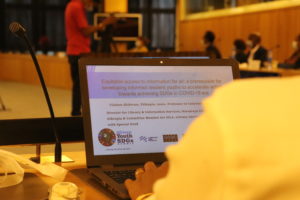 On the 9th March 2022, the IFLA Sub-Saharan African Regional Division Committee (IFLA SSA RDC) organised a hybrid side event in the context of its participation at the 4th African Youth Sustainable Development Goals Summit, that took place in Addis Ababa, Ethiopia.
On the 9th March 2022, the IFLA Sub-Saharan African Regional Division Committee (IFLA SSA RDC) organised a hybrid side event in the context of its participation at the 4th African Youth Sustainable Development Goals Summit, that took place in Addis Ababa, Ethiopia.
The fourth African Youth SDGs Summit, hosted by the Economic Commission for Africa (ECA), took from March 09 to 11, 2022 (see our report). On the first day, a hybrid side event was co-organised by IFLA, Library Aid Africa, Goethe-Institute Addis Ababa and the UN ECA Library.
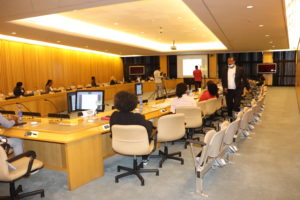 This event brought together young library leaders in Ethiopia, IFLA SSA RDC representatives, members of the ECA Library, Goethe-Institute Addis Ababa, and library stakeholders in Ethiopia, on the theme: Equitable Access to Information for All: Prerequisite for Developing Informed Resilient Youths to Accelerate Action Towards Achieving SDGs in Covid-19 Era.
This event brought together young library leaders in Ethiopia, IFLA SSA RDC representatives, members of the ECA Library, Goethe-Institute Addis Ababa, and library stakeholders in Ethiopia, on the theme: Equitable Access to Information for All: Prerequisite for Developing Informed Resilient Youths to Accelerate Action Towards Achieving SDGs in Covid-19 Era.
Objectives
The side event was largely publicized via the social media and other media channels, and the goal to:
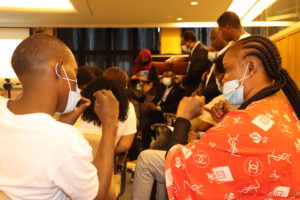 Educate and engage young people around the indispensable roles of information in youth resilience and accelerating pathways towards achieving the sustainable development agenda in the COVID-19 era;
Educate and engage young people around the indispensable roles of information in youth resilience and accelerating pathways towards achieving the sustainable development agenda in the COVID-19 era;- Create a hub of young Africans to drive advocacy, policy reforms, and initiatives that will facilitate equitable and meaningful access to information for all;
- Share and cross-pollinate experiences, ideas and best practices on techniques and approaches to develop informed literate resilient youths that will accelerate actions towards achieving the SDGs.
The side event started with an introduction remark from the facilitator, Damilare Oyedele, IFLA SSA RDC Member, and Co-Founder and Chief Executive, Library Aid Africa. Two distinguished papers were selected and presented.
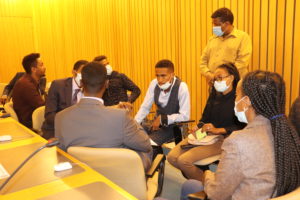
- Mulugeta Woldetsadik, Librarian from Hawassa University presented Librarians as advocates for change: role and contributions to the SDGs: a call to action in a digital era
- Tilahun Shiferaw, Assistant Professor of Information Science, and Director for Library & Information Services, at the Haramaya University spoke about Equity Access to Information: libraries and the 2030’s SDGs
Librarians as Advocates for Change to Achieve the SDGs
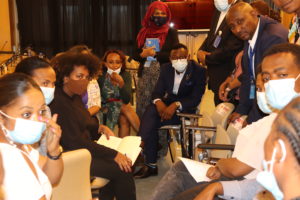 The first paper titled: Librarians as advocates for change: role and contributions to the SDGs: a call to action in a digital era, was presented in a virtual format by Mulugeta Woldetsadik, Librarian from Hawassa University (Ethiopia). The main interest of this paper was on library advocacy and information literacy, with particular focus on access to libraries in higher educational institution, digital information resources and institutional repositories. The author explained the importance of social and professional networking, and the role of libraries and librarians in achieving the Sustainable Development Goals (SDGs).
The first paper titled: Librarians as advocates for change: role and contributions to the SDGs: a call to action in a digital era, was presented in a virtual format by Mulugeta Woldetsadik, Librarian from Hawassa University (Ethiopia). The main interest of this paper was on library advocacy and information literacy, with particular focus on access to libraries in higher educational institution, digital information resources and institutional repositories. The author explained the importance of social and professional networking, and the role of libraries and librarians in achieving the Sustainable Development Goals (SDGs).
The author argued that: “it is apparent that policy makers, government officials or administrators and the general public in Ethiopia still do not appreciate the role of libraries and librarians in our society”.
According to the author, librarians themselves are partly responsible for is state of affairs. He further explained that librarians perform classic routine library tasks, such as processing, lending and returning materials. 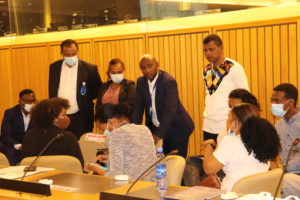 However, considering the needs of the 21st century library, they do not aspire to be innovative and creative, understand and work their community, and build partnerships with local, regional, national and international stakeholders.
However, considering the needs of the 21st century library, they do not aspire to be innovative and creative, understand and work their community, and build partnerships with local, regional, national and international stakeholders.
To conclude his presentation, the author called on library and information professionals to come out of their comfort zones and create impact through partnerships and networking. He added that this is essential to transform the present status of libraries, from traditional or transactional to a virtual environment, necessary to build a resilient response to the challenges of the Covid-19 era, and to significantly contribute to achieving the United Nations 2030 Agenda and its Sustainable Development Goals.
Equity Not Equality in Access to Information in Achieving the SDGs
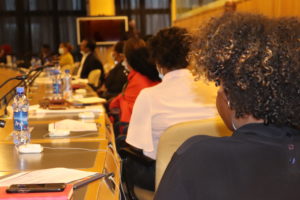 The second paper titled: Equity of Access to Information: libraries and the 2030’s SDGs, was presented in an in-person format by Tilahun Shiferaw, Assistant Professor of Information Science, and Director for Library & Information Services, at the Haramaya University (Ethiopia). This paper focused on the question of equity as opposed to equality to access to information in achieving the SDGs.
The second paper titled: Equity of Access to Information: libraries and the 2030’s SDGs, was presented in an in-person format by Tilahun Shiferaw, Assistant Professor of Information Science, and Director for Library & Information Services, at the Haramaya University (Ethiopia). This paper focused on the question of equity as opposed to equality to access to information in achieving the SDGs.
The author explained that information and knowledge are strategic resources for human development, but people require literacy to effectively identify, acquire, and use these resources for development. He further explained that poor, vulnerable, and under privileged people over the world need access to appropriate information and skills to tackle poverty, illiteracy, and isolation.
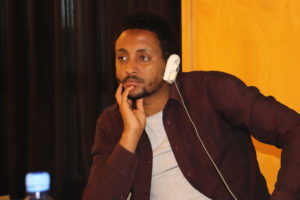 He argued that the establishment of libraries that are rooted in the communities they serve is one way of ensuring that the poor and the marginalized have access to free and unlimited information to enable them to formulate informed decisions that can transform their lives. The author looked at the issue of the digital divide in Africa and the need to access information with full potential. The author further argued that equity is not like equality. Equity looks at special treatment, bringing on board the marginalized and disabled, while equality implies treating everyone the same, regardless of their different needs.
He argued that the establishment of libraries that are rooted in the communities they serve is one way of ensuring that the poor and the marginalized have access to free and unlimited information to enable them to formulate informed decisions that can transform their lives. The author looked at the issue of the digital divide in Africa and the need to access information with full potential. The author further argued that equity is not like equality. Equity looks at special treatment, bringing on board the marginalized and disabled, while equality implies treating everyone the same, regardless of their different needs.
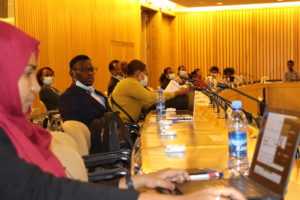
He concluded by recommending that as information professionals, we need to build the capacity of the population to access and use information, assess the needs of the public, as the library is one of the key tools to achieve equity, accessibility and use of information, thereby facilitating the achievement of the SDGs; automate, network, organize exhibitions, documenting the community’s history, etc., as this allow the community to better understand the work and role of libraries; and support collaborative digital collections and mutualized resources (promote inter-library loans, open access, shared use, and increase professional training).
He added that the digital divide creates a knowledge gap, and a development gap, thus modern libraries should help to bridge the digital divide by providing access to information using different methods and tools, both traditional and modern.
He called on authorities to facilitate access to information, by encourage the creation of information and ICT centres in social places where people mostly pass their time, and argued that the government should include this for monitoring and evaluation metrics.
Advocating for Change: What Strategy?
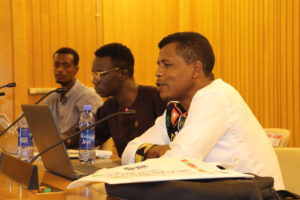 At the end of the presentations, participants raised questions related to the type of advocacy needed to respond to the worsening impact of the digital divide, COVID-19, and the closure of libraries; and equally, the approach needed in collecting the history of the society, especially in marginalized settings. The second author explained that the challenges are multifaceted. He recommended that a robust advocacy strategy is needed to provide adequate responses to issues ranging from ICT illiteracy, investment in ICTs, socio-economic and political will power. He confirmed that history is knowledge, and the role of librarians is to collect knowledge. So it is the responsibility of librarians to collect information which is good for the community.
At the end of the presentations, participants raised questions related to the type of advocacy needed to respond to the worsening impact of the digital divide, COVID-19, and the closure of libraries; and equally, the approach needed in collecting the history of the society, especially in marginalized settings. The second author explained that the challenges are multifaceted. He recommended that a robust advocacy strategy is needed to provide adequate responses to issues ranging from ICT illiteracy, investment in ICTs, socio-economic and political will power. He confirmed that history is knowledge, and the role of librarians is to collect knowledge. So it is the responsibility of librarians to collect information which is good for the community.
Call to Action
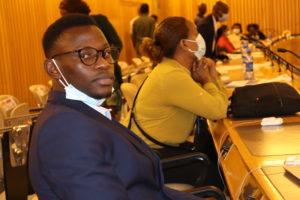 Based on their reflection on the question: How can libraries better serve their public, to gain knowledge and skills to accelerate action towards achieving the SDGs in the Covid-19 era?, the participants formulated the following called to action:
Based on their reflection on the question: How can libraries better serve their public, to gain knowledge and skills to accelerate action towards achieving the SDGs in the Covid-19 era?, the participants formulated the following called to action:
To the Public:
- Put your trust in and use libraries to access information, both in physical and digital formats.
To Libraries and Librarians
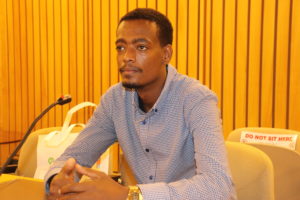 Build a relationship of trust with the community by providing access to their own history and trusted contents that respect their values.
Build a relationship of trust with the community by providing access to their own history and trusted contents that respect their values.- Adopt and appropriate ICT tools, including mobile applications, open-source repositories, and translate contents into local languages to promote equitable access to information.
- Improve access to information in communities by exploiting the services and capacity of liaison persons or library champions.
- Mobile information services or mobile library with contents in local languages should be extended to rural areas and run by persons with appropriate skills.
- Collect, process, disseminate and promote the sharing of information and raise awareness about the SDGs to the community.
- Be leaders not only managers. Not bosses but impatient and dedicated actors, working with empathy and making sure we practically achieve the SDGs.
To Authorities
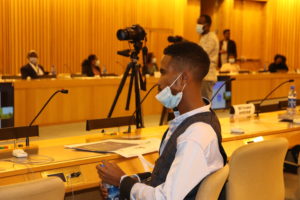 Libraries should have access to airtime in community radio and television channels, and to conceive and broadcast programs in local languages that create awareness on the need to access and use information for local development.
Libraries should have access to airtime in community radio and television channels, and to conceive and broadcast programs in local languages that create awareness on the need to access and use information for local development.- Provide the material, human and financial resources needed to respond to the threats of COVID-19 and make libraries a safer place for the public.
- Change perceptions and consider libraries and librarians as major actors in achieving the SDGs.